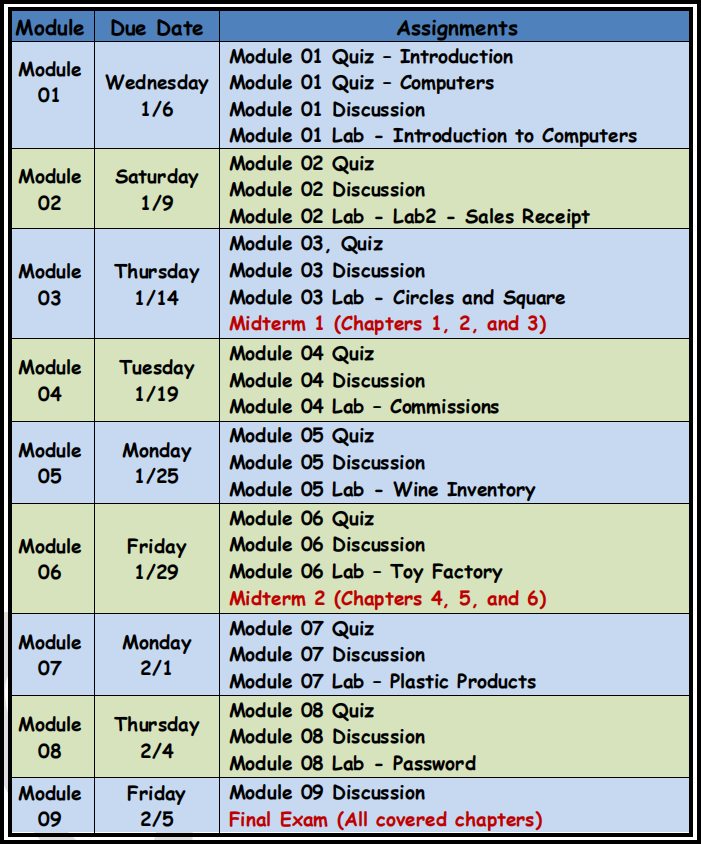Winter 2021, Classes 12449 & 12450
Instructor: Matt Pakbaz
Email: [email protected]
Telephone: (213) 763-7268
Location: Online
Online Lecture followed by Office hours:
Mondays and Wednesdays (11:00 AM to 1:00 PM)
No class on Monday 1/18/21 (MLK Day).
Units: 3
Transfer: UC, CSU
Prerequisite: N/A
Recommended Preparation:
CIS 104 Computer Application or CIS 102 Computer Concepts
Course Description:
This class provides an introduction to the use of the C++ programming system. It emphasizes the syntax and grammar of its coding language. The method of instruction is the use of the system to implement computer application projects using the traditional programming structures of sequence, selection, and loops, use of functions, arrays and strings and how different data types work.
Course Purpose/Objectives:
Upon completion of this course the student will be able to:
• Show an understanding of a program procedure that calculates an answer from embedded data, and displays the result
• Demonstrate an understanding of a program procedure that calculates and displays results using built-in (library) functions
• Demonstrate a comprehension of a program procedure that displays a menu, prompts the user to select a choice, and displays a result based on the choice
• Explain a program procedure that selects a specific action from multiple choices
• Design a program procedure that performs the same actions on a sequence of items
• Show an understanding of a program procedure that calculates cumulative results using an iteration procedure
• Demonstrate a comprehension of a program procedure that calculates results with user defined functions
• Show an understanding of a program that has a modular structure and uses functions
• Demonstrate a comprehension of a program procedure that uses grouped data - array processing
• Design a program procedure that uses text data modification methods
Student Learning Outcome:
Use the syntax and grammar of the C++ programming language to create programs that are representative of commonly used business and engineering procedures. Assessed by project assignments.
Text/Materials:
Text:
Tony Gaddis
Starting Out with C++: From Control Structures through Objects, 9/E
Pearson, 2017
ISBN-13: 978-0-13-449837-9
ISBN-10: 0-13-449837-2
Loose leaf, PDF, and Brief versions are usually less expensive.
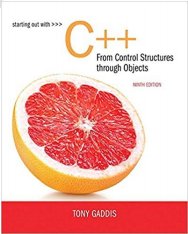
Software:
1. Microsoft Windows2. Visual Studio Community 2019 Free Visual Studio download Please make sure you download VS Community Select Desktop Development for C++ during installation.3. Mac users can use Xcode.
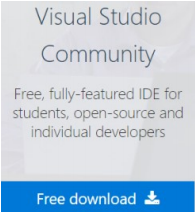
Storage: A USB storage device (flash drive) is strongly recommended. Always have at least one backup copy of your projects. There is no guarantee that your computer will always function adequately. If you wish, you can also use cloud storage.
Teaching Methods:
1. Online Lectures: Online live lectures will be offered through Zoon, an online conferencing service. Important material from the text and outside sources will be covered in the online lectures. Participation and discussion are important and encouraged. You will be able to code along with the instructor. You can also ask questions during the lectures. Please make sure you have a microphone. Also, having a webcam is recommended. Participation and discussion in lectures are important and encouraged, but not mandatory. The instructor will record and post the lecture videos. However, because of possible technical difficulties, that is not always guaranteed.
2. Assignments: There will be one lab assignment for each chapter of the textbook we cover. All lab assignments must be submitted before the due date. Please refer to the Tentative Course Outline table in this syllabus for assignments. All assignments will be locked, and you will not be able to submit them after 11:59 PM on the due date. No late assignments will be accepted. These are individual, not group assignments. For all your programming assignments, please copy and paste your codes in a text file (Notepad or a similar software with “.txt” file extension). Submit the text file on Canvas.
3. Exams: There will be two midterms and one final exam in this class. The exams will include materials in the textbook and all extra materials covered in the class, including the lectures, video tutorials, presentations, and discussions. Each exam can be taken only once. All exams have due dates and time limits. They will be terminated at 11:59 PM on the due dates, even if you are in the middle of the exam. Please do not wait until the last moment to take the exams. Technical difficulties can happen.
4. Quizzes: There are a total of nine quizzes in this class. There will be no time limit for quizzes. You can take them as many times as you wish. Your highest grade for each quiz will be recorded in the gradebook. Exam questions are similar to, or sometimes the same as, the quiz questions. The more you repeat taking the quizzes, the more you will have a chance of getting a better grade in the exams.
5. Discussions: There will be one discussion board for each class module. All module discussions are graded. You must post your reply and answers to other students’ replies.
Participation is mandatory.
Q & A Discussion is not graded. However, it indicates your level of participation. Use this discussion board to ask questions regarding the class. Please do not use emails if you have a general question.
All exams, quizzes, and assignments may be changed at the instructor's discretion.
Grading:
Letter grades will be determined using a standard percentage point evaluation as outlined below. Grades may be curved after the total semester points have been tabulated. However, do not count on a curve to obtain your desired grade.
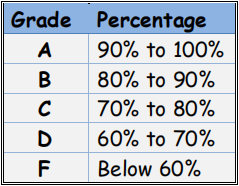
Total percentages will be computed as follows:
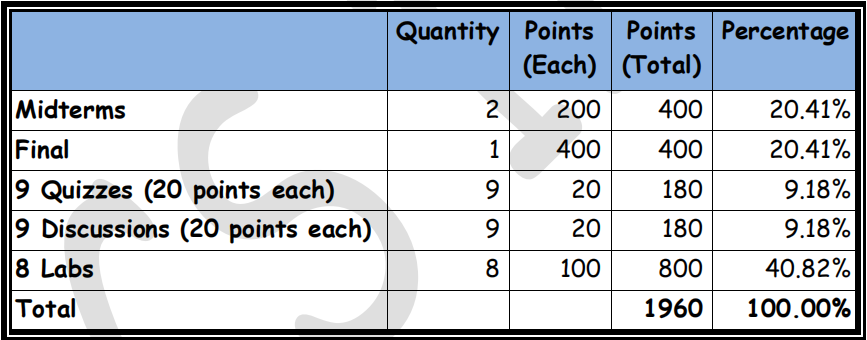
Course Policies:
Lab Assignments: Please refer to the Tentative Course Outline table in this syllabus for lab assignments. There will be one lab assignment for each chapter of the textbook we cover. All lab assignments must be submitted before the due date. Assignments will be locked after 11:59 on the due date. You will not be able to submit any assignment after 11:59. Please be advised that these are individual, not group assignments. Each student must work independently on their own assignments.
Makeup: Due to the nature of online classes, there will be no makeups in this class. All assignments, quizzes, exams, and discussion will lock at 11:59 on the due date. Please do not wait until the last moment. No late assignments will be accepted. No exceptions! Technical difficulties can happen. If you encounter a last moment power outage, or internet interruption, that will be your sole responsibility. The college and the instructor will not be responsible for your technical issues.
Academic Dishonesty: Violations of academic integrity of any type by a student provides grounds for disciplinary action by the instructor or college. Violations of Academic Integrity include, but are not limited to, the following actions: cheating on an exam, plagiarism, copying codes from the internet, working together on an assignment, paper or project when the instructor has specifically stated students should not do so, submitting the same assignment to more than one instructor, or allowing another individual to assume one’s identity for the purpose of enhancing one’s grade. For more information on the Standards of Student Conduct refer to the college catalog available in hard copy and online at www.lattc.edu.
Participation: Participation is mandatory in this class. Students may be dropped from class for failure to participate, particularly in the first week of the class. Each one of the following is considered lack of participation: not visiting the class site on a regular basis, not submitting assignments, not replying on discussion boards, and not taking quizzes and exams. While participation in live lectures is not mandatory, it is strongly recommended.
Financial Assistance: If you need help paying for books and other college expenses,contact the Financial Aid Office at the Second Floor Lobby of the Student Services Building.
Disability: Students with a verified disability who may need a reasonable accommodation(s) for this class are encouraged to notify the instructor and contact the Office of Special Services (Mariposa Bld. D3-100, 213-763-3773) as soon as possible. All information will remain confidential.
CS 116 Tentative Course Outline
